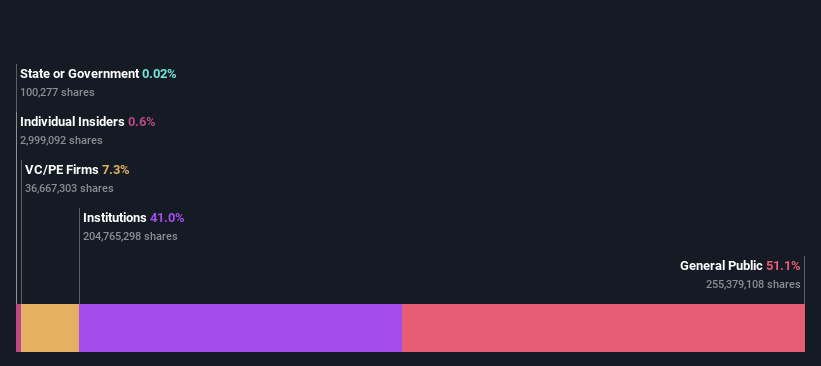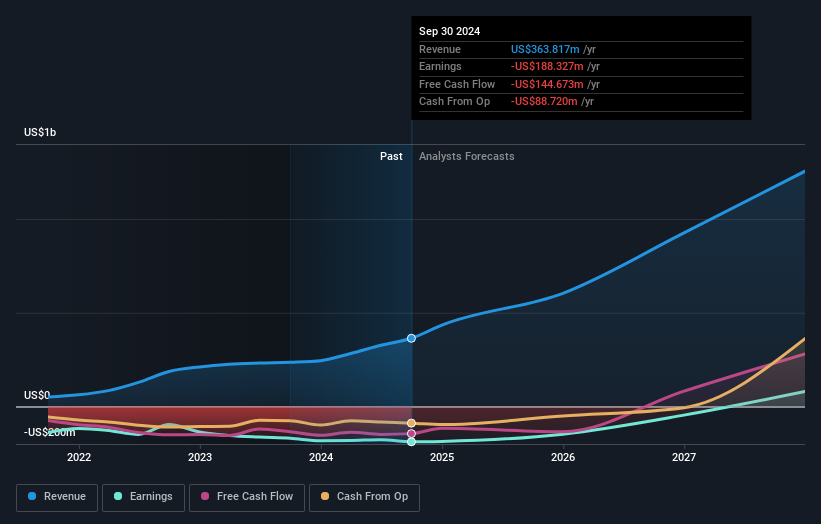- United States
- /
- Aerospace & Defense
- /
- NasdaqCM:RKLB
While institutions own 41% of Rocket Lab USA, Inc. (NASDAQ:RKLB), retail investors are its largest shareholders with 51% ownership
Key Insights
- Significant control over Rocket Lab USA by retail investors implies that the general public has more power to influence management and governance-related decisions
- 41% of the business is held by the top 25 shareholders
- Insiders have sold recently
Every investor in Rocket Lab USA, Inc. (NASDAQ:RKLB) should be aware of the most powerful shareholder groups. With 51% stake, retail investors possess the maximum shares in the company. That is, the group stands to benefit the most if the stock rises (or lose the most if there is a downturn).
Meanwhile, institutions make up 41% of the company’s shareholders. Institutions often own shares in more established companies, while it's not unusual to see insiders own a fair bit of smaller companies.
In the chart below, we zoom in on the different ownership groups of Rocket Lab USA.
View our latest analysis for Rocket Lab USA

What Does The Institutional Ownership Tell Us About Rocket Lab USA?
Many institutions measure their performance against an index that approximates the local market. So they usually pay more attention to companies that are included in major indices.
Rocket Lab USA already has institutions on the share registry. Indeed, they own a respectable stake in the company. This suggests some credibility amongst professional investors. But we can't rely on that fact alone since institutions make bad investments sometimes, just like everyone does. If multiple institutions change their view on a stock at the same time, you could see the share price drop fast. It's therefore worth looking at Rocket Lab USA's earnings history below. Of course, the future is what really matters.

Rocket Lab USA is not owned by hedge funds. Our data shows that Deer Management Company, LLC is the largest shareholder with 7.3% of shares outstanding. The Vanguard Group, Inc. is the second largest shareholder owning 7.1% of common stock, and BlackRock, Inc. holds about 6.0% of the company stock.
A deeper look at our ownership data shows that the top 25 shareholders collectively hold less than half of the register, suggesting a large group of small holders where no single shareholder has a majority.
Researching institutional ownership is a good way to gauge and filter a stock's expected performance. The same can be achieved by studying analyst sentiments. Quite a few analysts cover the stock, so you could look into forecast growth quite easily.
Insider Ownership Of Rocket Lab USA
The definition of company insiders can be subjective and does vary between jurisdictions. Our data reflects individual insiders, capturing board members at the very least. Company management run the business, but the CEO will answer to the board, even if he or she is a member of it.
Insider ownership is positive when it signals leadership are thinking like the true owners of the company. However, high insider ownership can also give immense power to a small group within the company. This can be negative in some circumstances.
Our data suggests that insiders own under 1% of Rocket Lab USA, Inc. in their own names. Being so large, we would not expect insiders to own a large proportion of the stock. Collectively, they own US$86m of stock. It is always good to see at least some insider ownership, but it might be worth checking if those insiders have been selling.
General Public Ownership
The general public, mostly comprising of individual investors, collectively holds 51% of Rocket Lab USA shares. With this amount of ownership, retail investors can collectively play a role in decisions that affect shareholder returns, such as dividend policies and the appointment of directors. They can also exercise the power to vote on acquisitions or mergers that may not improve profitability.
Private Equity Ownership
With a stake of 7.3%, private equity firms could influence the Rocket Lab USA board. Sometimes we see private equity stick around for the long term, but generally speaking they have a shorter investment horizon and -- as the name suggests -- don't invest in public companies much. After some time they may look to sell and redeploy capital elsewhere.
Next Steps:
I find it very interesting to look at who exactly owns a company. But to truly gain insight, we need to consider other information, too. Take risks for example - Rocket Lab USA has 2 warning signs we think you should be aware of.
If you would prefer discover what analysts are predicting in terms of future growth, do not miss this free report on analyst forecasts.
NB: Figures in this article are calculated using data from the last twelve months, which refer to the 12-month period ending on the last date of the month the financial statement is dated. This may not be consistent with full year annual report figures.
New: AI Stock Screener & Alerts
Our new AI Stock Screener scans the market every day to uncover opportunities.
• Dividend Powerhouses (3%+ Yield)
• Undervalued Small Caps with Insider Buying
• High growth Tech and AI Companies
Or build your own from over 50 metrics.
Have feedback on this article? Concerned about the content? Get in touch with us directly. Alternatively, email editorial-team (at) simplywallst.com.
This article by Simply Wall St is general in nature. We provide commentary based on historical data and analyst forecasts only using an unbiased methodology and our articles are not intended to be financial advice. It does not constitute a recommendation to buy or sell any stock, and does not take account of your objectives, or your financial situation. We aim to bring you long-term focused analysis driven by fundamental data. Note that our analysis may not factor in the latest price-sensitive company announcements or qualitative material. Simply Wall St has no position in any stocks mentioned.
About NasdaqCM:RKLB
Rocket Lab
A space company, provides launch services and space systems solutions in the United States, Canada, Japan, and internationally.
High growth potential with adequate balance sheet.
Similar Companies
Market Insights
Community Narratives



